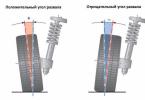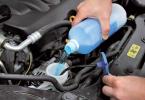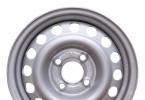Quite often there are situations when, when adding gas, the driver notices that the engine is not working properly. Not reacting to a breakdown, he drives until the engine starts to stall spontaneously. And only now, basically, the car owner begins to find out the cause of the malfunction.
Fuel filter - as one of the causes of car malfunction
There are many reasons for the malfunctioning of the engine, however, the main culprit is the fuel filter, which is clogged. Due to such a breakdown, when the key is turned, the car engine may not start at all. Almost all car manufacturers claim that the fuel filter must have enough life for the entire life of the car. However, practice shows something completely different: the need to replace it arises approximately every 20 thousand km of run.
Purpose of fuel filters
The fuel filter removes various impurities from the fuel. It is installed in internal combustion engine power systems, cars and other vehicles. There are filters for coarse cleaning (mesh, band-slotted plate-slot) and fine filters, capable of retaining the smallest particles. Fuel filtering is necessary to remove:
- dust particles, rust, dirt, which are present in metal containers in which fuel is stored and transported;
- resins formed in the course of chemical reactions in the fuel;
- water, snow, condensation, rain that fall into the fuel tank during the process of refueling the vehicle.
Solid particles settle in the thin channels of the nozzles and injectors and disrupt the functioning of the engine power system, water contributes to the formation of corrosion, and in winter it freezes and prevents the engine from starting. To prevent this from happening, you should replace this part on time.
Basic requirements for fuel filters
During the manufacturing process, filter manufacturers strictly comply with all the requirements of international standards for these products:
- the ability to remove the maximum amount of impurities;
- poor flow resistance;
- reliability of work in critical modes;
- small size;
- ease of maintenance;
- compliance with environmental standards.
Filters that meet the above requirements for any car brand can be ordered on the website. Here is a huge assortment with a wide price range, here you can find and.
How to choose the right fuel filter
The filter should be chosen strictly according to the manufacturer's catalog. This is the only way to guarantee its compliance with a specific model and type of vehicle. It is strictly forbidden to select a filter based on coincidences in appearance, thread, because completely different filters may have the same body and thread, however, the parameters of the throughput, maximum and working pressure of opening-closing are significantly different for them. Looking into the catalog of the site, where a huge selection is presented, you will surely find the desired filter option, and your favorite car will breathe a new breath.
Fuel filter- one of the inconspicuous consumable items in the car, which ensures the serviceable, and most importantly, long engine operation. Its purpose is to remove solid particles, water, as well as dust, paraffins, and in general everything that the fuel mixture can bring with it from the fuel of the car (gasoline, gas, diesel).
The high quality of the filter guarantees long and trouble-free engine operation. Immediately we draw a conclusion: without saving on the fuel filter, you reduce the possible costs of repairing the internal combustion engine.
Principle of operation and possible malfunctions
The fuel filter is conveniently positioned between the fuel tank and the engine, and in older cars it is located right in front of the carburetor. Filters for diesel cars are equipped with a membrane that helps separate water from the incoming diesel. Car enthusiasts should remember that an old fuel filter cannot be cleaned on their own, so they will have to buy a new one.
A clogged filter is indicated by the following:
- The dynamics and power of the car has decreased;
- Fuel consumption has increased;
- Rough motor operation.
The filter malfunction describes the following situation: at high speeds you want to make a maneuver, somehow overtake, but when you press the gas pedal, the speed does not increase (the motor is troit). Another option: you simply stalled at a traffic light.
The design of the simplest filter includes a housing with an installed filter element. Fuel, moving along the inlet pipe, enters the housing, particles in it are filtered out, after which it moves along the outlet pipe. The filter element itself is folded or star-shaped, or wound in a spiral (filtration in this case is better).
The most advanced filters contain a special honeycomb material inside. Moving deep into the filter, the fuel is purified gradually - first, large particles are separated from it, then smaller ones.
The importance of the filter
Injectors of injection internal combustion engines react sharply to the purity of the fuel. Dust, dirt, paraffins, sulfur and much more are quickly deposited in them. Due to the lack of the required amount of fuel, a loss of power is observed, or even a failure of a separate injector.
The fuel filter is especially important for car owners in Ukraine, Russia, Kazakhstan and Belarus. The fact is that our fuel is inferior to European quality. Specialists notice impurities in gasoline and diesel even in the laboratory, and motorists realize their presence on the road. Try to examine your fuel filter and estimate how much dirt would be on the injectors, pistons and engine walls if this very filter was not present. You can see:
- Dirt. This indicates a high percentage of asphaltenes and resins in the fuel;
- Black dust. Speaks about the presence of manganese additives;
- Undulating curvature. There is a large amount of water in the fuel;
- Black slime. Fungus and bacteria turned out to be in the fuel.

To summarize: a fuel filter is vital, don't skimp on buying it.
Dealing with the replacement time
The manufacturer helps you with this. Examine the documents for the car, or contact a specialist at the service station. The latter option is preferable if you are used to refueling at various gas stations and are not sure about the quality of the fuel. In general, European cars need to change the fuel filter on average every 20,000 kilometers if the engine is gasoline, and every 50,000 kilometers if it is diesel. In the vastness of the aforementioned countries, this distance may turn out to be half as much.
Another option is to carry out the replacement ahead of schedule. It is enough to remove the filter and see how clogged the corrugation is and how much black plaque it has collected. Again, the quality of gasoline at domestic gas stations leaves much to be desired, so we advise you to periodically check your filter and be reinsured by carrying out an early replacement. Trust me, your car engine will only get better.

What types of fuel filters are found
The classification is simple and straightforward. It has the following structure:
- Carburetor... Very simple filters designed for high pressure systems. Do not allow particles up to 15 microns in size;
- Injection... Designed for a wide range of pressures. Hidden in a very robust housing, they provide fine cleaning of the incoming fuel. Retain litter up to 10 microns in size;
- Diesel... Sophisticated filters that are able to retain both fine particles and paraffin, water. Modern filters retain all particles with a size of at least 5 microns;
- Gas(for vehicles with LPG). They clean the gas from impurities.
Filters for diesel cars
Diesel fuel filters should be discussed separately. The fact is that such a fuel system is very sensitive to impurities in the fuel, and in particular to water. Water in poor quality filters flows further into the injection system, disrupting the combustion process and contributing to corrosion.
Diesel filters are required to maintain their properties at temperatures below 0C. In a diesel engine, paraffin crystallizes, clogging up a conventional filter. Special filters, which are often found on the market, control the temperature of the incoming fuel. If such control is not provided in them, in the cold, viscous diesel fuel with paraffin crystals will pass through them, due to which the filter becomes clogged. In this case, the engine loses power and may stall.

On the complexity of the choice
As is the case with many other parts, check with the "primer" supplied with your car. The characteristics of the purchased filter must match those stated by the manufacturer. Namely, these are: linear dimensions, the fineness of the dropout, the type of engine and its volume.
The subtlety of the dropout- the amount of litter, the dimensions of which are determined by the filter manufacturer, retained by the filter itself. It is customary to denote it as a percentage. The following levels are distinguished: average, nominal, absolute.
- Average dropout- the filter will retain 50% of particles of a certain size;
- Nominal- similar, but 95% of particles are retained;
- Absolute- 100% of particles are eliminated.
So, let's try to decipher what the fuel filter manufacturer writes. It is written: "Nominal screening fineness 10 microns." We read like this: "The filter retains 95% of unwanted particles (5% will go further through the system), the linear dimensions of which are not less than 10 microns."
A quick tour of the brands
Inexpensive: Bosch, Hengst (Germany), Blue Print (UK), UFI (Italy), Puflux (France). The market share of the aforementioned brands is aiming for 70%

Also pay attention to the following budget filters: Profit, WIX, Starline (Czech Republic, Poland). The quality of their filters is not the highest, but they meet many standards.
Determine the fake
We have already said that cheap filters should be at the very bottom of a motorist's shopping list. However, you can put a budget Starline on a car, but by no means a fake one. Determining which is which is not difficult:
- Appearance. On the filter body you can find the article, engraving or stamping (on metal or plastic, respectively), the manufacturer's logo, as well as the product number;
- Price. Beware of too cheap fuel filters, which drop in price by 2 times during the holidays. The price will never fall many times below the calculated level, discounts up to 35% are already very rare;
- Gaskets. The manufacturer uses sealing elements that practically do not react to the action of fuel. The shape of the spacers must be correct. Counterfeit filters often do not have any gaskets where the hoses are connected to the filter itself;
- Package. A serious manufacturer spends money not only on the product, but also on its packaging. First, the company logo and name should catch your eye. Secondly, the print itself is of high quality. Thirdly, the design as a whole should be catchy and memorable; you will not find the original filter in ordinary white boxes;

- Build quality. There is no rustling or dangling inside the filter. All parts are well assembled, if they need to be glued, they are glued well;
- Metal processing. The equipment used in official factories allows metal to be processed well. There will be no scratches, chips, burrs on it. By the way, plastic cases already hint at a shameless fake - this material simply does not withstand high pressure in the system.
How to determine the quality of a product?
Even large factories sometimes produce defective auto parts. In the case of filters, according to the points listed below, you can also identify a fake, albeit a relatively well-executed one:
- The paper quickly became clogged with solids. By the way, it is worth periodically removing the filter and visually examining it. If some part of the filter quickly clogs up, you can be sure: the product will last for 10 thousand kilometers maximum;
- Poor quality of the paper itself. It is almost impossible to determine visually. The bottom line is that small villi will be separated from the filter element, which then enter the fuel system;
- Low winding density. Explicit savings in materials. If the winding density is low, the filtration quality will tend to zero.

Low-quality filters do their job, but they have to be changed more often high quality.
Output
A well-chosen fuel filter will avoid problems in the long-term operation of the engine. It is especially important if you know little about the quality of fuel at the filling stations, the services of which you are used to using.
If you complain about the engine during the inspection, the craftsmen will most likely study the consumables. They will examine the old filter and tell you if it is worth buying a similar one in the future. Your best assistants in choosing a fuel filter will be experts, operating manuals and knowledge of the above.
The fuel equipment of a diesel engine is very sensitive to contamination. All cleaning work is done by the diesel fuel filters. Before entering directly into the combustion chambers, diesel fuel goes through 3 stages of cleaning: preliminary filtration in the fuel tank, stages of "coarse" and "fine" cleaning.
Problems Solved by Diesel Fuel Filters
The main task of such filters is to prevent the penetration of abrasive impurities and resins resulting from chemical reactions into the fuel line and combustion chambers. Due to the high moisture content in diesel fuel, unlike gasoline, diesel fuel filters must condense water and remove it in a large volume from the fuel supply equipment.
At the same time, diesel fuel has a high content of paraffins, which crystallize at negative temperatures. The ingress of such particles into the engine often becomes dangerous for it. The best way to combat this problem is to use heated filters.
If the diesel fuel filter is already clogged with wax, it must be replaced.
Stages of cleaning diesel fuel and types of filters
The first obstacle in the way of suspended matter in the fuel is the filter element in the vehicle's fuel tank. As a rule, it is a frame sealed into a mesh, which is an obstacle for solid particles. This type of cleaning cannot prevent the ingress of fine particles, water, paraffins and resins into the fuel equipment.
But thanks to it, most of the large elements - corrosion products and debris - are eliminated. They are found in any fuel tank. This prevents clogging of the low pressure lines, and also significantly increases the service life of the coarse filter.

In most cases, the replacement of this element is not regulated by the manufacturer, but it is recommended to do so. Its service life directly depends on the novelty of the car, its technical condition and fuel quality. The mesh element in the car's tank is the cheapest link in the entire fuel supply chain to the engine, but no less important, so you should not neglect its checking and, if necessary, replacing it.
For the second stage, coarse fuel filters (settling filters) are responsible. Their name is due to the presence of a settling glass. In the lower part, it is equipped with a damper, thanks to which it is possible to remove water.
And in its upper part there is a mesh or plate filter element that allows you to get rid of particles up to 0.05 mm in size remaining after the first stage. Further, the fuel enters the low pressure fuel pump (LPF).
This type of filter has a drain plug for cleaning the glass from condensate and sediment. Most of the filter-settling tanks are of a collapsible design. This arrangement of the fuel filter of a diesel engine makes it possible to wash and, if necessary, replace the filter element and thereby restore the cleaning efficiency.
A special type of filters at this stage are heated separators for diesel fuel. Their price is much higher than that of conventional settling filters, but the quality of fuel cleaning is more effective, and heating solves the problem of paraffins. They are capable of removing up to 95% of water and impurities from diesel fuel.
The cleaning process begins with the stage of heating the fuel, which prevents the crystallization of paraffins and water. Further, under the action of centrifugal forces arising from the swirling of the emulsion passing through special channels, water and impurities are separated and deposited in a settling glass.
To separate smaller particles, the principle of changing the direction of flow is used, which is implemented using the separator blades. The final step is a pleated cartridge that removes the smallest solids.
Often there are coarse filters connected to a booster pump or fine filter.

In most cases, contamination of coarse filters will not be felt during vehicle operation, because the performance of the low pressure fuel pump is always higher than necessary for the stable operation of the engine. Therefore, in order to prevent costly repairs, it is necessary to promptly remove the accumulated water and debris from the sump and not to ignore the need to replace the filter element.
The final obstacle for the fuel before it enters the diesel engine is the "fine" filter. It allows you to get rid of the solid particles remaining in the previous stages, which are not visible to the eye, as well as from the formed resins. Another of its functions is to protect the engine from air trapped in the fuel in the early stages of cleaning.
Through the nozzle valve, air with excess fuel is discharged back into the tank. The temperature difference between the discharged mixture and the fuel in the tank contributes to the formation of condensation and an increase in the water content. The function of "fine" cleaning at this stage is performed by a replaceable element consisting of special porous paper.
Often, the replacement of only this element is regulated by the manufacturer. Because of this, it becomes a common mistake to ignore the need to maintain the remaining filter elements.
Fuel filter selection
Consider the design of your vehicle before choosing any diesel fuel filter. Never use a petrol fuel filter! It will not be able to prevent water and wax from entering the engine.

Most modern diesel passenger cars of foreign production are equipped only with a "fine" filter. In this case, one cannot be limited only to compliance with the regulations. It is necessary to equip the vehicle with an additional fuel cleaning unit. The ideal option would be to install a heated filter separator.
Here are the main characteristics that you should pay attention to when choosing it: throughput, heating element power, filtration quality, permissible pressure and dimensions of the product. For normal operation of the vehicle, all these parameters must correspond to the features of the engine power system.
So, the throughput for engines with high-pressure fuel pumps (high pressure fuel pumps) is in the range from 20 to 50 l / h (in rare cases up to 60 l / h). And with Common Rail systems and unit injectors - from 40 to 80 l / h.
The same applies to the quality of filtration for engines with high pressure fuel pumps, a sufficient value will be 10-30 microns, and for Common Rail this parameter should not be worse than 2-5 microns. To create a centrifugal effect and high-quality filtration for cars with low fuel consumption, filters of a small volume should be chosen, and vice versa for high consumption.
Having decided on the type of filters, you should pay attention to their quality. Currently, the market is overflowing with all kinds of offers. With similar characteristics declared, the price may differ by 10 times. But do not give in to the temptation of this cheapness.
The best option would be to use original components, but if this is not possible, you should pay attention to reputable brands: Mann, Knecht, OE, Bosch, etc. Often such large companies are suppliers of original components. The higher the cost of the filter, the better the degree of its filtration.

Replacing the fuel filter
This procedure requires certain skills and experience. The technology for replacing elements is different for different car models. It is important to familiarize yourself with it before carrying out any work. Strict adherence to the replacement technology guarantees you the correct operation of the engine in the future.
With proper skill, this procedure can be performed independently. To do this, you need to remove the filter element, remove debris and water from the case, and get rid of air in the power system. If you do not know how to perform these steps, contact the service.



